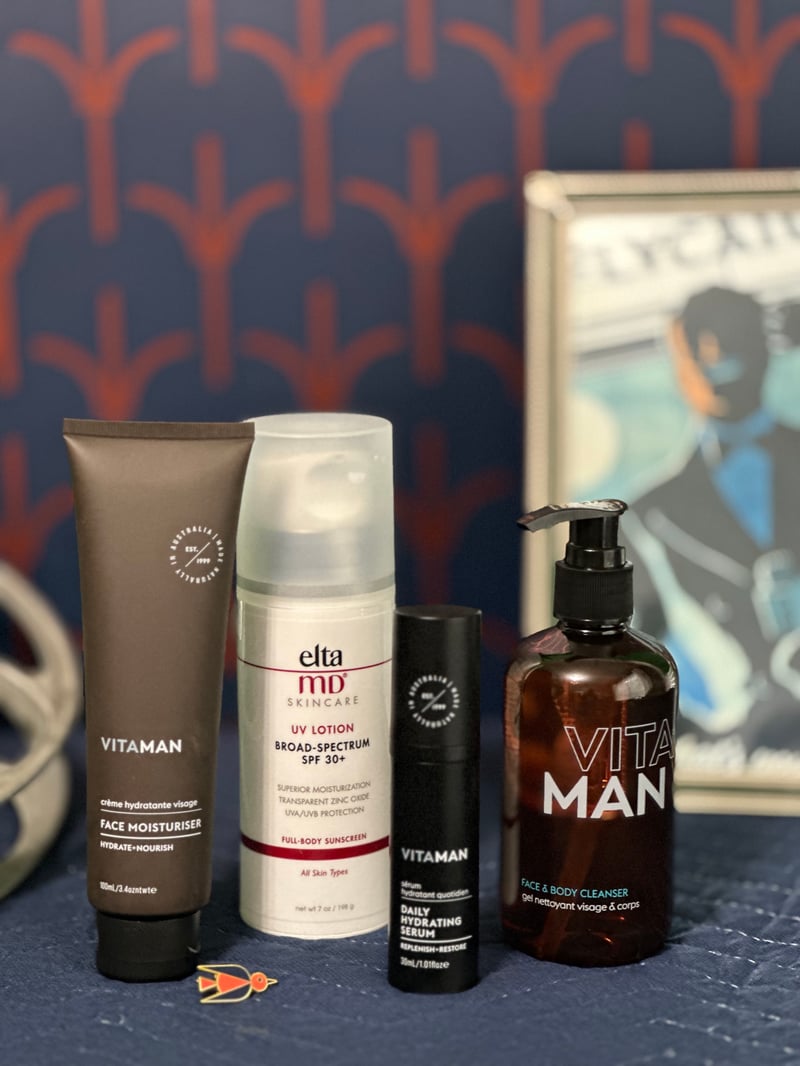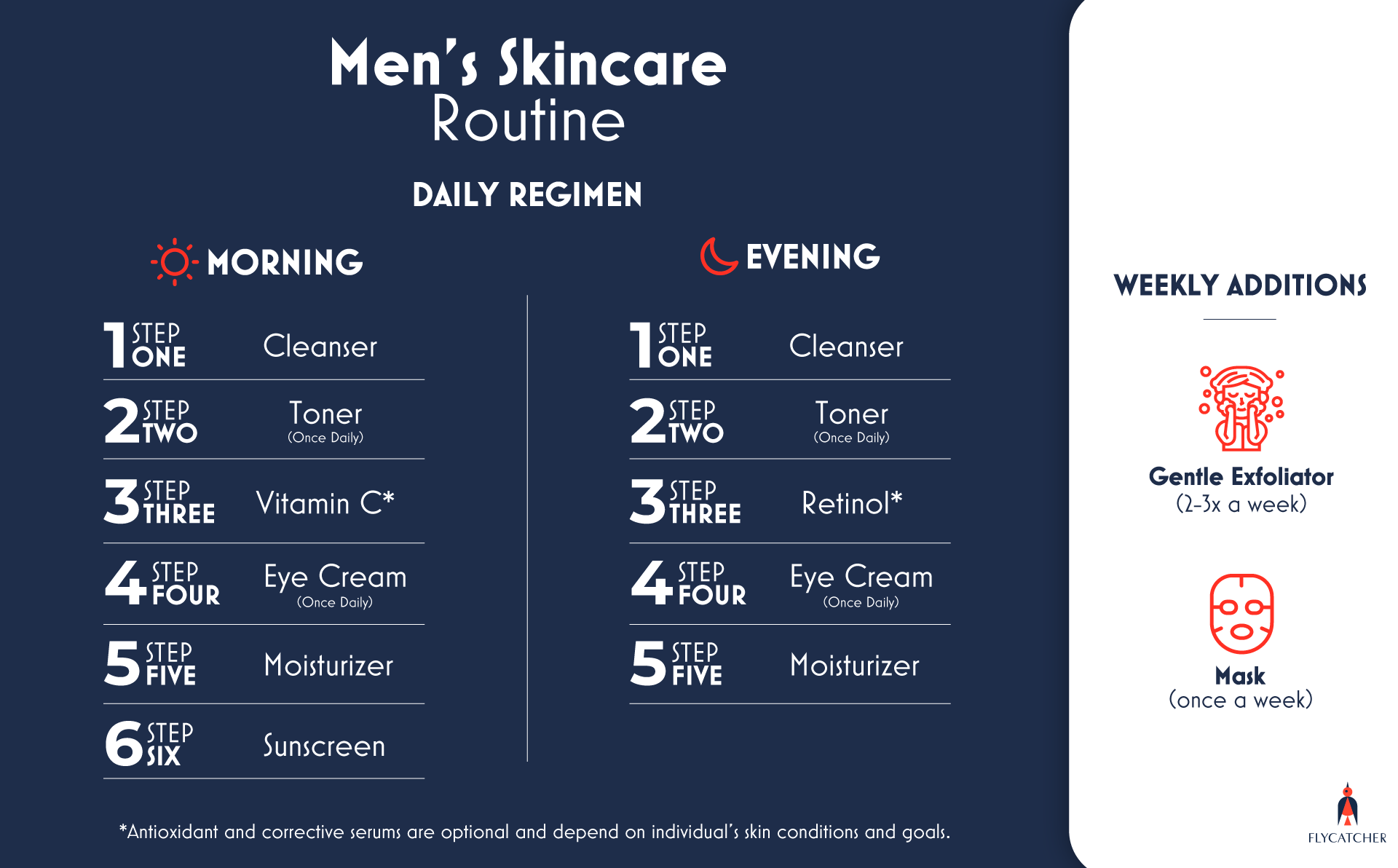
Skincare
Nov 11, 2023
Flycatcher Team
Mastering your At-Home Skincare routine: Where Old Hollywood Glamour Meets Texas Tough
Skincare isn't just for Hollywood A-listers; it's a crucial component for any man looking to take center stage in his own life. As gentlemen living in Central Texas, where the weather can be as unpredictable as a plot twist in a classic film, a consistent skincare routine and regimen are essential for looking and feeling your best.
Knowing Your Skin Type
Knowing your skin type is essential for any man who wants to take care of his skin effectively. Whether you have oily, dry, or combination skin, understanding your skin type allows you to choose the right products and develop a skincare routine that addresses your specific needs.
By knowing your skin type, you can avoid using products that may exacerbate your skin issues and instead focus on maintaining a healthy and vibrant complexion.
Dry Skin: The Demands and Solutions
Dry skin often feels tight, especially after cleansing. You might notice flaking, redness, or irritation. This skin type requires special attention to keep it hydrated and nourished. Moisturizing products containing hyaluronic acid or ceramides are essential for dry skin as they help to lock in moisture and prevent water loss. These ingredients act as powerful humectants, attracting water to the skin and retaining it, leaving your skin feeling plump and hydrated.
When choosing skincare products for dry skin, it's important to avoid sulfates and alcohols as they can further strip away moisture and exacerbate dryness. Look for gentle, hydrating cleansers that do not contain harsh ingredients. Additionally, opt for moisturizers that are rich in emollients and occlusive agents to create a protective barrier on the skin, preventing moisture loss throughout the day.
Incorporating a hydrating serum into your skincare routine can also provide an extra boost of moisture for dry skin. Serums containing hyaluronic acid or niacinamide can help to replenish and retain moisture, leaving your skin feeling soft and supple.
Oily Skin: Managing the Shine
Oily skin can be a challenging skin type to manage, but with the right products and routine, you can keep the shine under control and maintain a healthy complexion. Oily skin is characterized by the overproduction of sebum, which can result in a shiny appearance and enlarged pores. This skin type is also more prone to acne and blackheads.
When it comes to caring for oily skin, it's important to use lightweight products that won't clog the pores or exacerbate oiliness. A gentle cleanser that contains salicylic acid can be particularly effective in controlling excess oil and preventing breakouts. Salicylic acid helps to unclog pores and remove dead skin cells, leaving your skin feeling clean and refreshed.
In addition to a cleanser, using a mattifying moisturizer can help to control shine throughout the day. Look for a moisturizer that is specifically formulated for oily skin and contains oil-absorbing ingredients like silica or kaolin clay. These ingredients work to absorb excess oil and leave your skin with a matte finish.
Combination Skin: Best of Both Worlds
Combination skin can be both oily and dry, often fluctuating based on the season or even parts of the face (oily T-zone but dry cheeks, for instance). It requires a bit of finesse—hydration for the dry areas and sebum control for the oily ones. A balanced skincare regimen that addresses both issues is crucial.
For those with combination skin, finding the right products and creating a skincare routine that caters to both oily and dry areas can be a challenge.
It's important to note that combination skin may require some experimentation to find the perfect balance for your unique skin type. Don't be afraid to try different products and pay attention to how your skin responds. Our professional estheticians will suggest trying a new product for an entire month, rather than only a week. That is, unless you notice adverse reactions, in which case immediately stop using the product.
Essentials of a Skin Care Routine

We get it: You only have so much time in your day for self-care. So, let's first examine the four most essential steps in a man's skincare routine.
Cleansing: The Opener
Cleansing is the first and most crucial step in any skincare routine, setting the stage much like a film's opening credits. A good cleanser not only removes dirt, grime, and excess oils, but it also provides a clean canvas for the following acts, allowing your other skincare products to play their roles more effectively.
For those with sensitive skin it's best to look for a sulfate-free cleanser. Sulfates are the proverbial villains in this plot—surfactants that can be harsh and drying, akin to a bad review that can sink a career. Our estheticians will tell you that sulfates are typically found in foaming cleansers, so steer clear of these products if you have sensitive skin.
Instead, choose a cleanser with soothing ingredients like aloe vera or chamomile. These natural ingenues have anti-inflammatory properties that can calm and soothe sensitive skin, making you ready for your red carpet moment, minus the redness and irritation.
Toning: The Plot Twist
Toner is an essential step in any skincare routine as it helps to rebalance the skin's pH levels, which can be disrupted during cleansing. A well-balanced pH is crucial for maintaining the skin's barrier function and hydration.
Regardless of your skin type, incorporating a toner into your skincare routine can help to enhance the overall effectiveness of your other skincare products. By rebalancing the skin's pH levels and tightening pores, toners create a clean and receptive canvas for the rest of your skincare routine. This allows your serums, moisturizers, and treatments to penetrate more deeply and deliver their benefits more effectively.
IMPORTANT: If you are using an inexpensive cleanser (or bar soap, heaven forbid) on your face, you will most likely need a separate toner in your regimen. Most high-end cleansers, like what we carry at Flycatcher, are formulated to balance the pH of your skin so you don't need a separate toner product.
Moisturizing: The Happy Ending
Just like the feel-good finales of classic Hollywood movies, moisturizing ensures everything wraps up on a high note. Moisturizing locks in hydration and forms a protective layer to prevent water loss.
For dry skin, a richer, cream-based moisturizer containing fatty acids is advisable. This type of moisturizer provides intense hydration and nourishment to replenish the skin's natural moisture barrier. It helps to soothe dryness, reduce flakiness, and restore a healthy, radiant complexion.
On the other hand, if you have oily skin, a gel-based moisturizer with hyaluronic acid can offer hydration without adding shine. This lightweight and non-greasy formula absorbs quickly into the skin, providing instant moisture and leaving a matte finish. The hyaluronic acid in the moisturizer helps to attract and retain water, ensuring your skin stays hydrated throughout the day without feeling heavy or greasy. It also helps to regulate sebum production, keeping oiliness at bay.
No matter your skin type, moisturizing is an essential step in any skincare routine. Morning and at night, gentleman! It not only keeps your skin hydrated and protected but also helps to improve its overall health and appearance.
Sunscreen: Roll Credits
UV radiation damages the skin and can lead to premature aging and increased risk of skin cancer. Flycatcher's estheticians always recommend using a broad-spectrum sunscreen with SPF 30 to 50, even on cloudy days.
Sunscreen is a vital component of any skincare routine for men. UV radiation from the sun is one of the leading causes of skin damage and premature aging. It can penetrate deep into the skin, causing DNA damage, collagen breakdown, and the formation of free radicals. Over time, this can lead to the development of fine lines, wrinkles, age spots, and even skin cancer.
Using a broad-spectrum sunscreen between SPF 30 and 50 is crucial because it provides protection against both UVA and UVB rays. UVA rays are responsible for premature aging, while UVB rays are the primary cause of sunburn. By using a broad-spectrum sunscreen, you can shield your skin from both types of harmful rays and minimize the risk of sun damage.
It's important to note that sunscreen should be applied generously and reapplied regularly, especially if you're spending extended periods outdoors. And, gentlemen, apply it to your neck and ears, not just your face!
A common mistake is applying too little sunscreen, which can significantly reduce its effectiveness. To ensure adequate protection, apply a generous amount of sunscreen to all exposed areas of your body at least 15 minutes before sun exposure. Reapply every two hours, or more frequently if you're sweating or swimming.
Even on cloudy days, UV rays can penetrate through the clouds and cause damage to your skin. Think of sunscreen as your script's superhero, swooping in to save the day. That's why it's crucial to make sunscreen a non-negotiable part of your daily skincare routine, regardless of the weather conditions.

Elevating Your Skin Care Regimen: Weekly Additions
Exfoliation: The Rewrite
Exfoliation is a crucial step in any man's skincare routine as it helps to remove dead skin cells, unclog pores, and reveal a brighter complexion. By sloughing away these dull skin cells, exfoliation allows other skincare products to penetrate more deeply, maximizing their effectiveness.
There are two types of exfoliants to choose from, depending on your skin type and preference. Physical exfoliants, also known as mechanical exfoliants, contain fine, non-abrasive granules that physically buff away dead skin cells. These can include ingredients like rice bran, jojoba beads, or finely ground walnut shells. These gentle exfoliants work by manually scrubbing away the top layer of dead skin cells, leaving your skin smoother and more radiant.
On the other hand, chemical exfoliants use ingredients like glycolic or lactic acid to dissolve the bonds that hold dead skin cells together. These types of exfoliants are particularly effective for those with sensitive or acne-prone skin, as they provide a more gentle and controlled exfoliation. Chemical exfoliants can also help to reduce the appearance of fine lines, hyperpigmentation, and uneven skin tone.
Regardless of the type of exfoliant you choose, it's important to exfoliate only two or three times a week to avoid over-exfoliation, which can lead to irritation and damage to the skin barrier. Over-exfoliating can strip the skin of its natural oils, leading to dryness, redness, and even breakouts.
To exfoliate, start by wetting your face with lukewarm water to soften the skin. Take a small amount of your chosen exfoliant and gently massage it onto your skin using circular motions, focusing on areas that tend to be more congested or textured, such as the nose, forehead, and chin. Be sure to avoid the delicate eye area. Rinse thoroughly with water and follow up with a toner and moisturizer to replenish and hydrate the skin.
Remember to listen to your skin and adjust the frequency and intensity of exfoliation based on its needs. If you notice any signs of sensitivity or irritation, reduce the frequency or switch to a gentler exfoliant. By finding the right balance, you can enjoy the benefits of exfoliation without compromising the health and integrity of your skin.
Face Masks: The Special Feature
Face masks are a fantastic addition to any skincare routine, providing targeted treatments for specific skin concerns. They offer a concentrated dose of ingredients that can address various issues, from excess oil and clogged pores to dryness and dehydration. By incorporating face masks into your skincare regimen, you can give your skin an extra boost and achieve optimum results.
For those with oily skin, clay masks are a game-changer. These masks have the ability to absorb excess oil and draw out impurities from deep within the pores, making them ideal for controlling shine and preventing breakouts. The clay acts like a magnet, attracting and removing dirt, grime, and oil, leaving your skin feeling clean and refreshed. Look for clay masks that contain ingredients like kaolin or bentonite, which are known for their oil-absorbing properties. Applying a clay mask once a week can help to balance oil production and reduce the appearance of enlarged pores, giving your skin a smoother and more refined look.
On the other hand, if you have dry or dehydrated skin, hydrating masks are your best friend. These masks are formulated with nourishing ingredients like hyaluronic acid, which has the ability to attract and retain water, providing intense hydration to parched skin. Hydrating masks also often contain ingredients like aloe vera or ceramides, which help to soothe and repair the skin's moisture barrier. Applying a hydrating mask regularly can replenish moisture levels, alleviate dryness and flakiness, and restore a healthy, plump complexion. Look for masks that are specifically designed for dry or dehydrated skin, and follow the instructions on the packaging for the best results.
When using face masks, it's important to follow the directions provided. Different masks have varying application times, ranging from 10 minutes to overnight. Some masks may need to be rinsed off with water, while others can be simply wiped away with a tissue or left on as an overnight treatment. Make sure to read and understand the instructions to ensure you're using the mask correctly and maximizing its benefits.
Sit back, relax, channel your inner Lone Ranger, and let the power of face masks transform your skincare routine into a luxurious and effective ritual.
Serums: The Directors Cut
Serums are like the directors of your skincare routine, providing targeted treatment for specific skin concerns. Whether you're dealing with hyperpigmentation, signs of aging, or dehydration, serums can be a powerful addition to your skincare lineup. What sets them apart from moisturizers is their higher concentration of active ingredients, allowing them to deliver potent and effective results.
When it comes to choosing a serum, it's important to consider your specific skin concern. If you're looking to brighten and even out your skin tone, a serum rich in antioxidants like Vitamin C can be a game-changer. Vitamin C is known for its brightening properties and ability to fade dark spots and hyperpigmentation. Incorporating a Vitamin C serum into your morning routine can help to restore a more youthful and radiant complexion.
On the other hand, if your main concern is aging, a serum with retinol may be your best bet. Retinol is a powerful ingredient that stimulates collagen production, reduces the appearance of fine lines and wrinkles, and improves skin texture. It can also help to minimize the appearance of pores and even out skin tone. By incorporating a retinol serum into your nightly routine, you can turn back the clock and achieve a more youthful and rejuvenated complexion.
Regardless of the specific concern you're targeting, serums should be applied after cleansing and toning, but before moisturizing. This allows the active ingredients to penetrate deeply into the skin and work their magic. Start by applying a few drops of serum to your fingertips and gently patting it onto your face and neck. Allow the serum to absorb fully before moving on to your moisturizer.
It's important to note that serums are highly concentrated, so a little goes a long way. Using too much serum can overwhelm the skin and potentially cause irritation. Start with a small amount and gradually increase as needed. And don't forget to always follow the instructions provided by the manufacturer for the best results.
Eye Cream: The Close-Up
The skin around your eyes is incredibly delicate and thin, making it more prone to dryness and sensitivity. This delicate nature also means that it is one of the first areas to show signs of aging, such as fine lines and wrinkles. To combat these signs of aging and keep your eye area looking youthful and refreshed, it is essential to incorporate an eye cream into your skincare routine.
An eye cream specifically formulated with peptides can work wonders for the skin around your eyes. Peptides are small chains of amino acids that help to boost collagen production in the skin. Collagen is a protein that provides structure and elasticity to the skin, giving it a plump and firm appearance. As we age, our natural collagen production decreases, leading to sagging and wrinkling of the skin. By using an eye cream with peptides, you can stimulate collagen production and reduce the appearance of fine lines and wrinkles around your eyes.
In addition to peptides, there are other ingredients that can target specific concerns in the eye area. For those struggling with dark circles, ingredients like caffeine or Vitamin K can be beneficial. Caffeine helps to constrict blood vessels, reducing puffiness and dark circles under the eyes. Vitamin K, on the other hand, can help to strengthen blood vessels and minimize the appearance of dark circles.
When applying eye cream, it is important to use a gentle touch and pat the product onto the skin with your ring finger. The ring finger applies the least amount of pressure, ensuring that you do not tug or stretch the delicate skin around your eyes. Start from the inner corner of your eye and gently pat the cream outwards towards the temples. Be sure to also apply the eye cream to the brow bone and the area just under the eyebrows, as these areas can also benefit from the hydration and nourishment provided by the eye cream.
Common Mistakes: What Not to Do
Over-Exfoliating: The Sequel No One Asked For
Over-exfoliating can actually damage your skin's protective barrier, leading to redness, irritation, and increased sensitivity. Your skin naturally exfoliates dead skin cells; doing it excessively disrupts this natural process, akin to releasing too many sequels for a Hollywood classic.
When you over-exfoliate your skin, you're essentially stripping away its protective layer, leaving it vulnerable to environmental aggressors. This can result in redness, inflammation, and a compromised skin barrier. With an impaired barrier, your skin is more prone to moisture loss and can become dry, tight, and uncomfortable.
In addition to dryness and irritation, over-exfoliation can also trigger an increase in sebum production. This is because when you strip away too much oil from the skin, your body compensates by producing more oil to compensate for the loss. This can lead to clogged pores, breakouts, and an overall imbalance in your skin's natural oil production.
Using Hot Water: The Heated Plot Twist
While a hot shower might feel like a luxurious indulgence, especially during those cooler Texas months, it's important to be mindful of the potential effects on your skin. Hot water can actually strip your skin of its natural oils, leading to dryness and irritation. This can be especially problematic for those with already dry or sensitive skin. Stick with lukewarm water in the shower.
Skipping Sunscreen: The Forgotten Hero
We can't stress this enough—skipping sunscreen is like leaving out the hero in a classic Hollywood flick. As we mentioned above, UV radiation damages the skin and can lead to premature aging and increased risk of skin cancer. Always use a broad-spectrum sunscreen with SPF between 30 and 50, even on cloudy days.
Ignoring the Neck: The Underestimated Supporting Actor
Many men forget to extend their skincare routine to this area. The skin on your neck is thinner and more susceptible to signs of aging. Neglecting it can lead to uneven skin tone and premature aging.
Your neck is often exposed to the same environmental stressors as your face, such as UV radiation and pollution. These factors can contribute to the breakdown of collagen and elastin, leading to sagging skin, wrinkles, and uneven texture.
Morning versus Nighttime; and what’s the proper order to apply?!?!
When it comes to skincare routines for men, both morning and nighttime routines are important and serve different purposes.
In the morning, the focus is on protecting the skin from environmental stressors that it will encounter throughout the day. This includes applying sunscreen to shield the skin from harmful UV rays. Additionally, using a gentle cleanser in the morning can help remove any excess oil and impurities that may have accumulated overnight.
On the other hand, the nighttime skincare routine is all about repairing and rejuvenating the skin. During the night, the body goes into repair mode, making it an ideal time to apply products that can work their magic while you sleep. This includes using serums and creams that are rich in active ingredients, such as retinol or peptides, to target specific skin concerns like signs of aging or dehydration. Nighttime is also the perfect opportunity to incorporate an eye cream, which can help minimize the appearance of fine lines and wrinkles around the delicate eye area.
In terms of the proper order to apply skincare products, it's generally recommended to apply "thinnest to thickest", for example, starting with a wrinkle serum, then an eye cream, finishing off with your moisturizer. Finally, don't forget to apply sunscreen to protect your skin from harmful UV rays.
Conclusion: The Final Act

Consider this your call to action, not just for looking your best today but for setting the stage for healthy skin in all your future endeavors—be they in the rolling hill country or the urban streets of Austin.
At Flycatcher, we're here to help you achieve your skincare goals. Located in Spicewood, Texas, just three miles west of The Galleria in Bee Cave, we proudly serve Spicewood, Bee Cave, Lakeway, and the surrounding areas of Austin and the Texas Hill Country.
Our skincare professionals will be happy to meet with you one-on-one to assess your unique skin type, challenges, and goals, and help you develop a personalized treatment plan and/or in-home skincare regimen.
Reach us at (737) 239-0112 or request a consultation here.